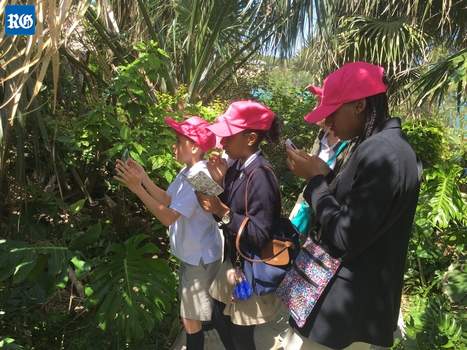Recent News
Sea turtle tangled in fishing line rescuedFriday, July 25, 2014
Efforts to protect Bermuda’s sea turtles have suffered another blow.
Bermuda Reef Life HD App Free For Android
Thursday, July 17, 2014
Fans of all things under the sea now have a new way of exploring the mysteries and wonders of Bermuda’s unique marine life as the Bermuda Zoological Society’s Bermuda Reef Life HD app is now available free for Android users
Chatterbox Preschool’s Art Auction To Aid BZS
Wednesday, July 16, 2014
Students at Chatterbox Preschool have recently been making waves in the art world, thanks to their recent studies about the ocean.
Blue Marlin donated for study
Monday, July 14, 2014
A Blue Marlin donated by the Billfish Tournament to the Ocean Vet team for research was hoisted for delivery to the Spanish Point Boat Club on July 11, with the 573 pound fish requiring a team of workers and several pieces of equipment to get it loaded and moved.
Minister Reports On State Of Bermuda Coral
Friday, July 11, 2014
In the House of Assembly today [July 11], Minister of Health, Seniors and Environment Jeanne Atherden delivered a report on the state of health of the coral reefs found in Bermuda’s waters and the Caribbean, citing the report by the Global Coral Reef Monitoring Network [GCRMN] released last week.
About
GovernanceAbout Us
Newsletter
Latest News
Gift & Bookstore
Contact
General Inquiries
info@bzs.bm
Latest News
All the latest updates and news from the Bermuda Aquarium, Museum, and Zoo, one of Bermuda's leading visitor attractions!
Cindy Corday
Published May 25, 2017 at 8:00 am (Updated May 24, 2017 at 11:15 pm)

Springboard for learning: students explore the fascinating world of BAMZ
Bermuda Centre for Creative Learning teachers were recently contemplating how to inspire their students to create a non-fiction children’s information book.
Rather than take the traditional route: providing them with a list of subjects, or a supply of books to look through, they thought — why not use the Bermuda Aquarium Museum and Zoo, BAMZ, as a springboard for student learning, and let them lead the way? Students in this multi-age setting, began this non-fiction genre with a discussion about their prior experiences at BAMZ; the areas they recalled visiting and the animals and exhibits they enjoyed the most.
With BAMZ site maps, students were divided into small skill-set groups and created a plan of action for their upcoming trip to the site, based solely on their interests. A few days later, with digital devices in hand, they set off to BAMZ, super excited about their role as junior photographers.
Apart from a few guidelines from their teachers: take images of the animals and the signage at exhibits, stay with your group and be polite to others around you, the students cruised confidently throughout the site with great enthusiasm.
The interesting thing about this trip was that very little planning was involved — yet this experience took on a life of its own. Students worked really well with and helped each other. One commented, “Hey, here’s the Fossa, this is the animal I was telling you about! We’ve got to get a picture of him!” and another, “I was right, the flamingos get their colour from what they eat!” After the trip, and with parent help, students came back to school with the images they took loaded on to flash drives. The range of help from that point was differentiated: younger primary students had help printing their images and hand writing information, while older students set up PowerPoint pages, inserted the images and typed information about each animal in text boxes. Features of non-fiction text then became a meaningful process, because it was inspired by their work.
The end results proved that students who are involved in the process of their own learning, are far more engaged in the activity, retain information easily, than gathering information solely from a textbook or the internet. While helping to bind his book, one student noticed an error in the text and commented, “Wait, I see a problem on the page about the alligator. It says that most alligators eat about 50 meals a year, and the number of meals that humans eat isn’t there, it should say 1,000.” It was apparent that this student felt empowered about his project, clearly what teachers were hoping for.
Another aspect of learning at BCCL is to have empathy for others. Students wore pink baseball caps during the trip in honour of Mrs Kitty Ray, a friend who lives in Alexandria, Virginia and is courageously battling cancer. The Bermuda Centre for Creative Learning is a private school for students who have Dyslexia and other language-based learning differences beginning from age seven. BCCL is the first school of its kind on island, with the goal of changing the conversation about individuals who learn differently.
•Visit www.bermudacreativelearning.com for information


